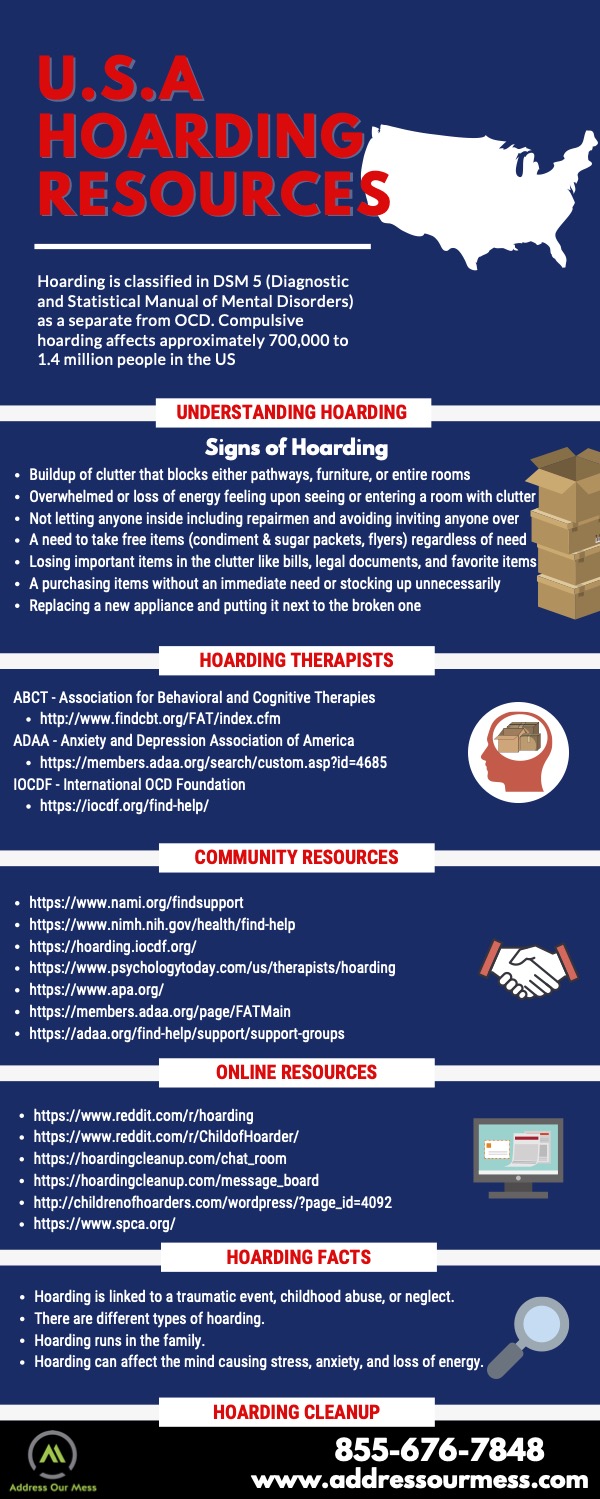Hoarding Resources
Hoarding is a disorder that needs to be addressed by mental health specialists and if necessary cleaning and organization specialists who know how to treat individuals with hoarding disorder. For this reason we compiled a list of resources that can be used by anyone in the U.S.A.
Hoarding Therapists
ABCT - Association for Behavioral and Cognitive Therapies:
ADAA - Anxiety and Depression Association of America:
IOCDF - International OCD Foundation:
Community Resources
- nami.org/findsupport
- nimh.nih.gov/health/find-help
- hoarding.iocdf.org
- psychologytoday.com/us/therapists/hoarding
- apa.org
- members.adaa.org
- adaa.org/find-help/support/support-groups
Online Resources
- reddit.com/r/hoarding
- reddit.com/r/ChildofHoarder/
- hoardingcleanup.com/chat_room
- hoardingcleanup.com/message_board
- childrenofhoarders.com
- spca.org
Understanding Hoarding
HOARDING FACTS:
- Hoarding is linked to a traumatic event, childhood abuse, or neglect
- There are different types of hoarding
- Hoarding runs in the family
- Hoarding can affect the mind causing stress, anxiety, and loss of energy
SIGNS OF HOARDING:
- Buildup of clutter that blocks either pathways, furniture, or entire rooms
- Overwhelmed or loss of energy feeling upon seeing or entering a room with clutter
- Not letting anyone inside including repairmen and avoiding inviting anyone over
- A need to take free items (condiment & sugar packets, flyers) regardless of need
- Losing important items in the clutter like bills, legal documents, and favorite items
- A purchasing items without an immediate need or stocking up unnecessarily
- Replacing a new appliance and putting it next to the broken one
Hoarding Cleanup Process
The cleanup process requires communication and saying or doing the wrong thing can shut down the line of communication. Read our do's and don'ts of hoarding before confronting someone with a hoarding condition. Keeping calm about the situation and treating the objects in the environment as the hoarder's possessions and not clutter or junk will go a long way to keeping up the communication and open the path to cleanup. Hoarding shouldn't be treated as a bad habit that can easily be rectified. Hoarding is classified in DSM 5 (Diagnostic and Statistical Manual of Mental Disorders) as a separate from OCD. Compulsive hoarding affects approximately 700,000 to 1.4 million people in the US.
Call 410-589-2747 for more information or email info@addressourmess.com. We are here to help!
